#socioeconomics
Text
This is something I’ve thought about for a hot minute and i wanted to make an essay on it :))
socioeconomics in slam dunk
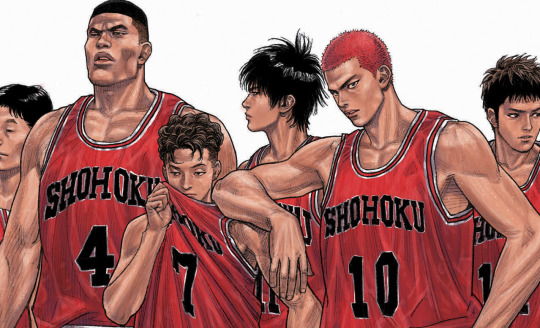
Like many things in life, basketball is a money sport. While inherent talent and skill is incredibly important, without the resources and opportunities to succeed, you can only get so far.
Throughout Slam Dunk, the importance of money and how it has a massive role in the world of basketball is not explicitly stated, but through the depictions of different teams in the series, it is prevalent.
We are first introduced to Shohoku High, a public school in Kanagawa. Shohoku is not a “poor” or “ghetto” school, but it is by no means a prestigious school either. Shohoku is initially depicted to be an ordinary school, but we are also shown how it has delinquency and school fights — especially among its protagonist and his “gang”
Shohoku’s normalcy is extended into its clubs, in particular, its basketball club. This club isn’t necessarily “run down” or “at risk of not existing anymore”, but aside from its coach (Coach Anzai, a man who used to coach the Japanese national team) and Akagi, their star center, Shohoku’s basketball team doesn’t have much going for it. Due to being a public school, Shohoku doesn’t have the money incentive to recruit star players (like some other schools I will mention soon), and most stars (besides Rukawa LOLLL) won’t go to an ordinary school “on a whim”
Moreover, the financial disparities become even more personal through the experiences of the characters themselves.
Sakuragi is hinted at to be poor, and the notion that basketball is “pay to play” is first explored through him in volume three, where Hikoichi (a player from Ryonan who “scouts” their competition) points out that it is strange Sakuragi doesn’t have basketball shoes, but he is quick to tell himself that it is likely because Sakuragi can’t afford them. Many basketball shoes, especially the Jordans that Sakuragi obtains throughout the series, are well over the $150-200 USD price range. While it is possible to play without basketball shoes, not having shoes that are designed for basketball automatically puts a player at a slight disadvantage.

This brings into question how resources—or the lack thereof—can subtly but significantly influence the trajectory of a player’s journey and a team’s potential for success. Sakuragi was lucky to have gotten practically free basketball shoes due to the generosity of a store owner, but those costs were his own out-of-pocket expenses. Unfortunately, a public school without special stipends for their programs cannot provide financial assistance to provide some of the resources to nurture potentially talented players.
While schools like Shohoku do not have funds to incentivize players or potential talent to come their way, they also do not have the funds to incentivize star coaches to coach at these schools. While Shohoku was able to have gotten Anzai (who wanted to retire by coaching highschool basketball), many public schools do not have that same luck.
In fact, the reason that two of the starting players, Mitsui and Miyagi, even decided to attend Shohoku was due to its coach, Coach Anzai. I think this goes to show that if a school invests in incentives like star coaches or a star basketball program, then these talented players will want to attend.
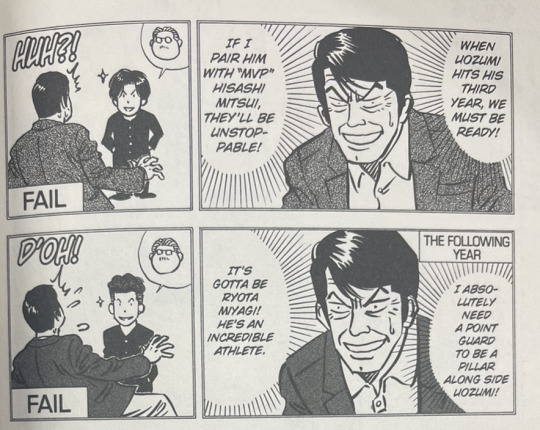
In terms of schools who provide ALL the incentives, and has thus led to star teams, I want to focus on Kainan, Shoyo, and (especially) Ryonan.
All are labelled as prestigious, private schools with amazing basketball programs, with Kainan having a stellar track record at nationals. But why is that? How did they get so.. good?
If I had to best answer this, money.
Ryonan is known to have scouted its star players, with Coach Taoka even scouting Sendoh and Fukuda from a junior high in Tokyo. For reference, Kanagawa is about two hours away from Tokyo, so Coach Taoka has to provide incentives for these boys to move to a different prefecture rather than staying in a city that likely has many powerhouse schools. In his case, these incentives would likely be full rides to Ryonan, as well as extra stipends to cover these student’s additional costs (such as food, money to move away, etc). Since Ryonan has the funding to do this, Coach Taoka is able to travel around to different areas, find these hidden talents, and bring them over to Ryonan. Public schools like Shohoku, who do not have allocated funds for sports programs, do not have this opportunity… and thus, are at an automatic disadvantage.
It is not explicitly stated how prestigious of a school Shoyo is, but having a program-related disadvantage affecting their players is prevalent. They do not have an official coach (for an unmentioned reason), and their star player Fujima has to coach his teammates as a result. Unfortunately, this additional responsibility prevented him from focusing on his own skills. I do believe Shoyo IS a school that has funding, but this highlights how a program being neglected directly impacts the strength of a team.
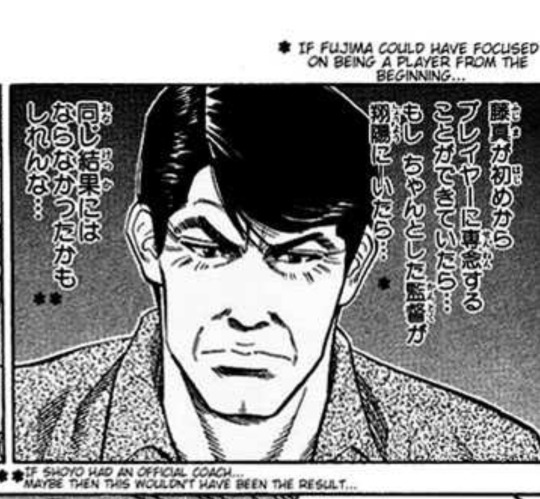
Another team I wanted to point out is Toyotama, a team that faced some of the most immense pressure in the entire series.
While Minami and Kishimoto, the team’s leaders, are characterized as “brute assholes”, it is shown that their irrational behavior stems from their pressure to perform well in order to potentially bring back their former coach, Coach Kitano.
Although Toyotama is 8th in the country, for the investors in their school’s basketball program, this isn’t enough. And thus… Coach Kitano was fired in the hopes of getting a coach who could lead the team to a better performance.
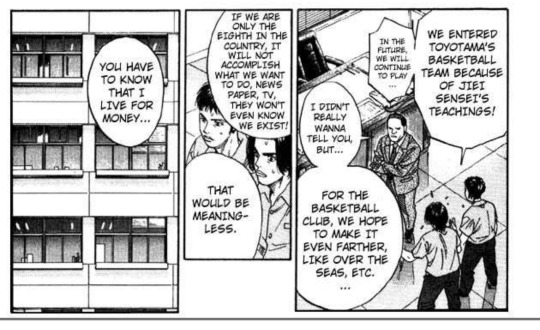
For these prestigious schools, their end goal is making a return on their investments. After all, what is the point of pouring all that money and resources for a team that doesn't even land them in the news?
While this is sad, it is very realistic. And as a result... even though Toyotama has a prestigious program, they felt even more pressure to *make a return." and this pressure poured into the team and their behavior.
However, the school that truly encapsulates the opportunities that money and resources provide for their players is Sannoh Technical High School.
Sannoh is practically a world class basketball team, with "anyone in Japan who gives a damn about basketball knows them", a team that had won nationals for years on end.
But how can one team be so good, let alone having a lasting legacy of greatness?
While their players are undoubtedly talented, Sannoh has invested aplenty into nurturing their players' talents.
Like Coach Taoka of Ryonan, Sannoh’s Coach Damoto scouts the best and brightest for their team. Eji Sawakita, although residing in a different prefecture, was discovered and scouted by Sannoh. While it isn't explicitly said how many players they scouted, or what incentives they provided Sawakita (aside from opportunities and their prestige), it can be inferred that Sannoh likely looks for the best and brighest to be apart of their teams.
In addition to the money and resources spent scouting, Sannoh provides their team with immense opportunities that most schools do not.
It is stated that Sawakita had been sent on a trip abroad to play basketball in America, and that he even learned new techniques during his trip. To say the least, a trip like that is... expensive. To send students to a country across the world just to play basketball is a hefty price to pay, and yet Sannoh was willing to pay it.
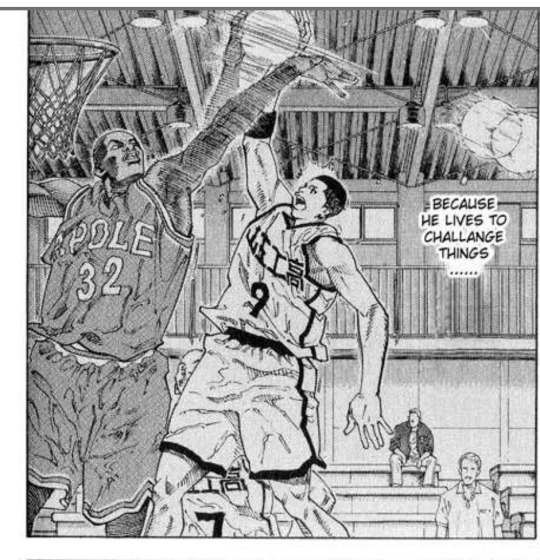
To prepare for Shohoku's match, Coach Damoto arranged a practice match with Sannoh alum who have a similar playstyle to Shohoku. While it is possible that these alum were willing to volunteer their time doing this, Damoto going out of his way to bring them all together and schedule that practice match is something that likely cost a significant amount to make happen. And it is certainly an opportunity that many schools would not provide.
Unfortunately, it is difficult to compete with money, and this sentiment is universal for any sector.
But what makes Shohoku’s victory over all these powerhouse schools, especially Sannoh, so shocking is the fact it is an “ordinary, no name school.” Theoretically, Shohoku would never beat a team like Sannoh, especially given the fact that Shohoku didn’t even have half the money, resources, and opportunities that Sannoh does.
Yet… Shohoku did it. And I think this part of why Slam Dunk is such a beautiful story: an ordinary team was, even for a moment, able to be extraordinary.
#slam dunk essay#slam dunk#スラムダンク#headcanon#slam dunk anime#anime and manga#blog#rukawa#hanamichi#sakuragi hanamichi#hisashi mitsui#shohoku#sannoh kogyo#sannoh#analysis#socioeconomics#sawakita#eiji sawakita#sawakita eiji#ryonan#sendoh akira#akira sendoh#sendoh#kichhou fukuda#the first slam dunk#slam dunk manga#fyp#in this essay i will#essay writing#hcs
56 notes
·
View notes
Text
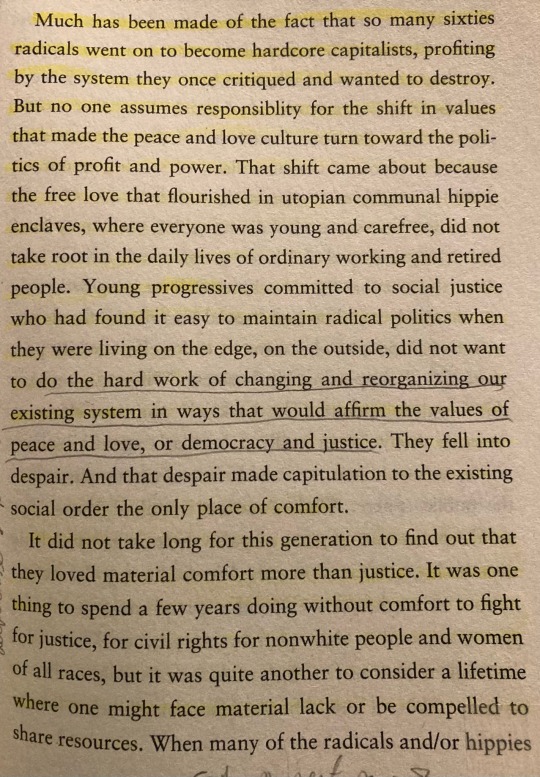
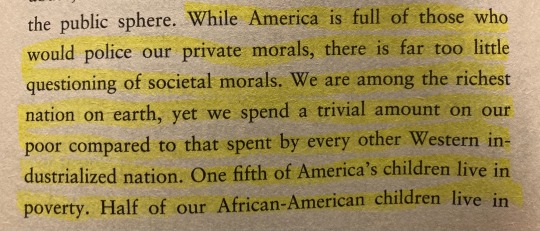
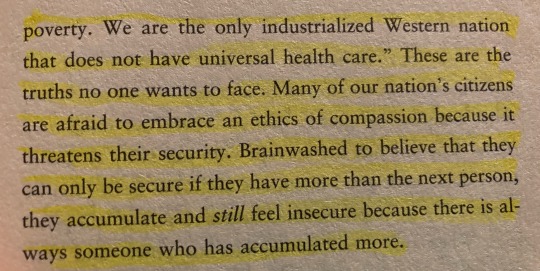
“All About Love” by bell hooks, p. 122 - 123
115 notes
·
View notes
Text
Too Many Ghosts
Leia gets off of Tatooine and makes some new friends.
#Duty Bound#Star Wars fic#time travel fix it#Leia Skywalker#Padmé Amidala#Eirtaé#C-3PO#paranioa#war#socioeconomics#research and development#Galen Erso#Lyra Erso#Jyn Erso#it only took me 550k words#but we are finally getting to the Death Star#hope you're ready#Don't Look Back
38 notes
·
View notes
Text
There's something that has become glaringly obvious to me as a working-class disabled queer person whose parents are non-disabled, not queer, and significantly more financially well off than I am (and have had a significant amount of disposable income for my entire life). Namely: there is a slice of the population, my parents very much included, whose lives and concerns are so well represented in the mainstream media, both news media and fiction, that it has genuinely never occurred to them that there could be a massive problem (or many massive problems) that they're not hearing about.
This really crystallized for me when my sister was talking about a conversation she had with our (also very well-off, mansion-owning) aunt and uncle. My sister, who's a public school teacher, mentioned feeling overworked and underpaid, which is the most common complaint I can possibly think of among public school teachers, and my uncle apparently tried to insist that my sister must be the only teacher who felt this way, or at least in a small minority, because if this were a large-scale problem, he would have heard about it. He couldn't fathom there being a big problem in his metro area that hadn't come to his personal attention.
Likewise, my mom talked to me last fall about how her department's assistant at work was having trouble finding appropriate health care for her daughter because of the daughter's specific diagnoses and needs--everywhere the assistant called said they had a long wait list, but the daughter needed care urgently. My mom insisted to me that there must be places that were both affordable and let urgent cases jump the line, because those things should exist, so in my mom's mind, naturally they do exist.
It's really hard to convey to people who are this privileged that the media leaves out huge swathes of the population and many, many massive societal problems, and that "this isn't on my radar" and "this doesn't exist" are not in fact equivalent statements. I think, at least in some cases, it's worth naming that explicitly: "Each of us only knows a small subset of what's going on in the world, and I'm telling you that this problem is real even though you haven't heard much about it until now."
I'll add that I don't think this is primarily a conspiracy by Big Media to obscure what's going on in society, at least not all the time. I think a large part of the problem is that the people with the largest media reach are generally privileged in a lot of ways, and they associate with other privileged people, which means that the concerns of less-privileged groups tend not to be top-of-mind for them. Sure, there are also efforts by editors and owners of some news outlets to deliberately mislead the public or suppress certain information or perspectives, but a lot of it also comes down to limited perspectives being self-perpetuating even without intention.
And sometimes it's useful to name explicitly that it's possible for a thing to happen without a specific person hearing about it.
#a lin original#classism#sj#socioeconomics#write better headlines#(not exactly but it's on that theme)
22 notes
·
View notes
Text
HOW CURRENCIES GOT THEIR NAMES 🤑💰💸
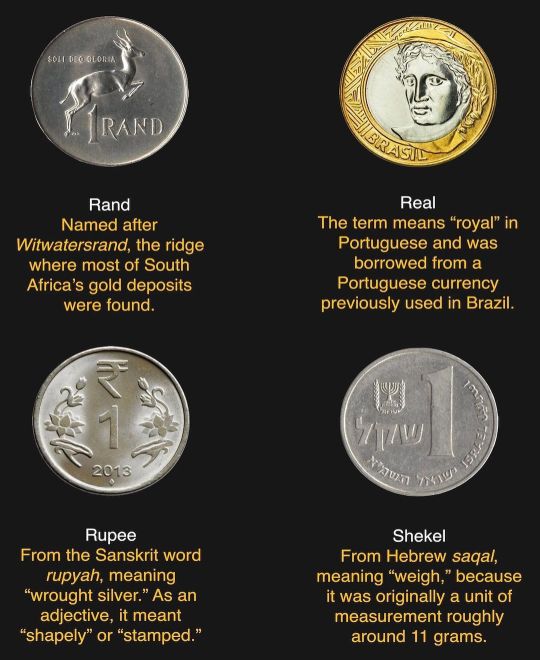




Credit to etymologynerd [Instagram]
#etymology#linguistics#nerd#money#💰#daily#infographic#infographics#currency#economics#history#socioeconomics
16 notes
·
View notes
Text
Holiday Theme: Happy Hogswatch
NAUGHTY AND NICE? said Death. BUT IT'S EASY TO BE NICE IF YOU'RE RICH. IS THIS FAIR?
Albert wanted to argue. He wanted to say, Really? In that case, how come so many of the rich buggers is bastards? And being poor don't mean being naughty, neither. We was poor when I were a kid, but we was honest. Well, more stupid than honest, to tell the truth. But basically honest.
He didn't argue, though. The master wasn't in any mood for it. He always did what needed to be done.
Terry Pratchett, Hogfather
#DEATH#albert#hogfather#discworld#terry pratchett#fair#not fair#poverty#wealth#socioeconomics#inequity#morality#ethics#character development#honest#easy if you're rich#naughty and nice#holiday theme: happy hogswatch
84 notes
·
View notes
Text

“For if you suffer your people to be ill-educated, and their manners to be corrupted from their infancy, and then punish them for those crimes to which their first education disposed them, what else is to be concluded from this, but that you first make thieves and then punish them.”
-Sir Thomas More
#thekbsmusic#philosophy books#western philosophy#philosophy#books & libraries#bookstagram#books and reading#booklover#booksbooksbooks#bookshelf#bookworm#book quotes#books#book recommendations#books and literature#socioeconomic#socioeconomics#politics
11 notes
·
View notes
Text
Like, I jest, but shit it would feel so good to just go apeshit, to just scream and claw the ground in a forest and be Seen, Witnessed and for that person to not turn away or try to soothe me but to rage With Me -- to know I'm not the only one out here that can See this bullshit we call society and how we're all just expected to be dutiful, gendered, imprisoned cogs in the orphan killing machine and I'm tired of being made to feel like my reactions to this is the thing that needs fixing, ya know?
#talking to myself#female rage#mental illness#world events#im coming unglued my dude#social justice#socioeconomics#unhinged women#midsommar
2 notes
·
View notes
Quote
The concept of Global North and Global South (or North–South divide in a global context) is used to describe a grouping of countries along socio-economic and political characteristics. The Global South is a term often used to identify regions within Latin America, Asia, Africa, and Oceania. It is one of a family of terms, including "Third World" and "Periphery", that denote regions outside Europe and North America, most (though not all) of these countries are low-income and often politically or culturally marginalized on one side of the divide, the other side being the countries of the Global North (often equated with developed countries). As such, the term does not inherently refer to a geographical south; for example, most of the Global South is geographically within the Northern Hemisphere.
Wikipedia
#quote#globalization#Global North#Global South#society#economics#socioeconomics#culture#geography#social#geopolitics
20 notes
·
View notes
Text
what you have loved is gone
now take what's left of you and
do what needs to be done
#mental health#betrayal#heartbreak#cheating#lying#stealing#prying#family#honor#shame#flying#science#space#earth#dying#bipolar#bpd#socioeconomics#yourfavoritetvshow#thebradybunch#shadowandbone#undertale
5 notes
·
View notes
Text
Why have I started releasing Soundworlds music under the Digital Commons Catalyst license?
The greater our publicly available commons, the lower the cost is to escape poverty or the precariat. This empowers innovation across society.
#music#universal basic income#ubi#open source#public domain#art#socioeconomics#source-available#soundworlds
4 notes
·
View notes
Text

Source
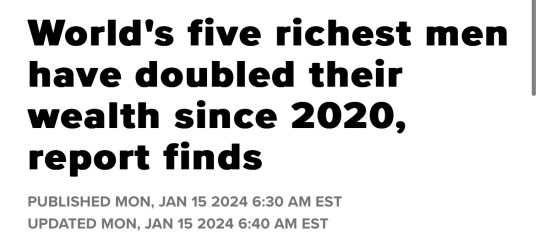
Source
#capitalism#eat the rich#tax the rich#news#current events#wealth inequality#income inequality#socioeconomic inequality#the left
32K notes
·
View notes
Text

"Anarchafeminism" by Chiara Bottici (p. 52)
8 notes
·
View notes
Text
Is there a word for the type of classism that arises when partaking in conversation which has the prerequisite of requiring money? The type of conversation that prohibits engagement from those without.
Examples:
Small talk about branded items
In depth conversations about paywalled activities
Banter about travel
It's rarely an intentional slight, but is definitely an ostracizing mode of communication. I've found myself on both sides of these discussions before, and I'm wondering if anyone else has experienced this or knows more about its effects at large.
1 note
·
View note
Text
I'm back on my Shitty Knight bullshit. Here goes:
I'm guessing Shitty’s dad paid for Shitty’s undergrad but not his law school. (I'm pretty sure Shitty was canonically a walk-on for SMH, meaning he wasn't recruited and didn't have an athletic scholarship.) There are scholarships for law school, but I don't think Shitty would have gotten a full ride to Harvard Law.
So Shitty graduates from Harvard Law in tens of thousands of dollars of debt, if not more. Lardo's a freelance artist still in the early stages of her career, so she's not making big bucks, and if Shitty becomes a public defender, he won't be either.
And like . . . broke student life is just different, at least in some ways, from broke post-school life. Shitty’s in an income-driven loan repayment plan/public service loan forgiveness, so the debt isn't as big a problem as it could be, but Boston is an expensive city to live in.
And I think there would come a point when Shitty would realize that he doesn't know how to be a low-income (or even middle-income) post-school adult. He went from living with his filthy rich father, to going to an ultra-elite boarding school for high school, to attending Ivies for undergrad and grad school. It's been a while since he had all the trappings of wealth he grew up with, but he's spent most of his life in very upper-class environments (with the Haus being the most prominent semi-exception, though as we know, hockey is an expensive sport and most of SMH comes from at least some degree of money).
And I don't primarily mean this in the sense that Shitty will realize all over again how privileged he is (though, being Shitty, he probably will). I primarily mean this in the sense that he'll realize there's a whole skill set involved in living without a lot of financial buffer or discretionary income, and that a lot of people gain this skill set by watching the people who raised them, and Shitty didn't. He had a head start when it came to a lot of academic knowledge and skills related to schmoozing, but he’s woefully behind when it comes to budgeting, cooking (especially on a budget), doing home maintenance or other repair work himself, etc.
I dunno, I just think there's a very particular kind of skill gap when you find yourself much, much poorer than your parents ever were, and I think it would be fascinating to explore this with Shitty in a genuinely empathetic way.
#check please#omgcp#omgcheckplease#a lin original#shitty knight#socioeconomics#welcome to mostly true stories with lin#there is a difference between 'i have money' and 'my terrible parents have money'
21 notes
·
View notes
Text
Genuinely don't see how someone can read about the fresh new atrocities places like Israel and the United States commit on a daily basis, learn about the (at least) 4 active genocides occurring at this moment, read and experience an exponentially worsening climate crisis, the starvation and famine, the economic and social disparity, the rising tide of political and religious extremism, the continued, deliberate reinforcement of slavery as a global institution... That anyone could see all of that and think that human beings as a whole are anything other than a self-destructive plague. These things are all echoes of history, the same stories and conflicts and barbarism retold over and over and over and over. It's in our nature to destroy ourselves, often on an individual level and most assuredly at a global scale. It will never stop, because it is beyond our capacity to stop.
0 notes